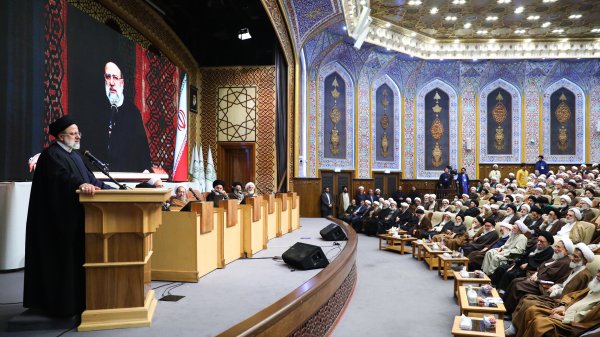
Iranian President Dr Seyyed Ebrahim Raisi addressing the "13th Conference of the Qom Seminary Teachers' Society" in Tehran today.
Washington/Vienna: The United States of America, France, Germany and the United Kingdom today condemned Iran for increasing its rate of production of uranium enriched up to 60% at Natanz and Fordow to levels observed between January and June 2023. “These findings represent a backwards step by Iran and will result in Iran tripling its monthly production rate of uranium enriched up to 60%,” they stated.
The International Atomic Energy Agency (IAEA) highlighted Iran’s move in its report on December 26, 2023 report. About a month earlier too, on November 22, Director General Rafael Mariano Grossi tabled his report on Verification and monitoring in the Islamic Republic of Iran in light of United Nations Security Council Resolution 2231 (2015) before the IAEA Board of Directors which mentioned that Iran’s stockpiles of uranium enriched up to 5%, enriched up to 20% and enriched up to 60% – high enriched uranium – all increased since AEA Board meeting in September 2023, with the increase of the 60% continuing at the same rate as reported then.
In a joint statement today the US, France, Germany and the UK termed Iran’s action as an “unabated escalation” of Iran’s nuclear programme. “The production of high-enriched uranium by Iran has no credible civilian justification and the reported production at the Fordow Fuel Enrichment Plant and the Pilot Fuel Enrichment Plant further carries significant proliferation-related risks. We also take note of Iran’s decision to revert to the same cascade configuration as the one discovered by the IAEA in Fordow earlier this year. Iran’s delay in declaring this change in January 2023 cast serious doubts on Iran’s willingness to cooperate with the IAEA in full transparency,” they stated.
Claiming that these decisions demonstrated Iran’s “lack of goodwill towards de-escalation” and represented “reckless behaviour in a tense regional context”, these countries urged Iran to immediately reverse its steps and de-escalate the nuclear programme.
“Iran must fully cooperate with the IAEA to enable it to provide assurances that its nuclear program is exclusively peaceful, and to re-designate the inspectors suspended in September 2023,” the joint statement said. While asserting their commitment to a diplomatic solution, these countries reaffirmed their determination that Iran must never develop a nuclear weapon.
Earlier during the November 22, 2023, Board of Governors’ meeting too, IAEA D-G Grossi, had regretted that Iran had made no further progress in implementing the Joint Statement signed in Tehran on March 4, 2023. Iran was yet to provide the Agency with technically credible explanations for the presence of uranium particles of anthropogenic origin at Varamin and Turquzabad and inform the Agency of the current location(s) of the nuclear material and/or of contaminated equipment.
It also still needed to resolve the discrepancy in the nuclear material balance evaluation relating to the Uranium Conversion Facility (UCF) and to implement modified Code 3.1 which is a legal obligation for Iran.
These outstanding safeguards issues stemmed from Iran’s obligations under its Comprehensive Safeguards Agreement and needed to be resolved for the IAEA to be in a position to assure that Iran’s nuclear programme was exclusively peaceful.
However, Iran instead, made a sudden withdrawal of the designations of several experienced inspectors, which Grossi termed as unprecedented and contrary to the cooperation that was required and expected to facilitate the effective implementation of its Comprehensive Safeguards Agreement. He said this was in contradiction of the spirit of cooperation agreed in the Joint Statement of March 2023.




